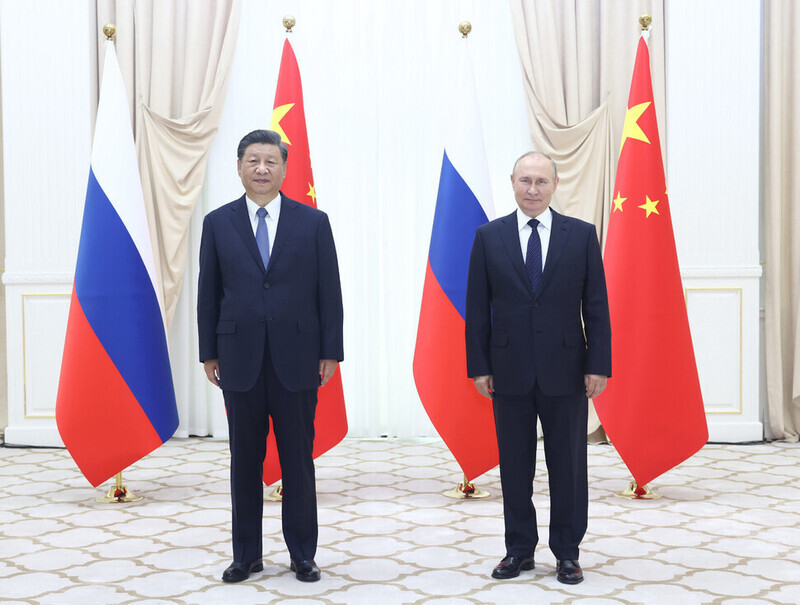hankyoreh
Links to other country sites 다른 나라 사이트 링크
[Column] Return of the “northern triangle” of Russia, China and N. Korea
The era of resolving problems through the triangular relationship between South Korea, North Korea and the US is over


By Kim Yeon-chul, former minister of unification and current professor at Inje University
The Cold War was a battle between blocs. Even on the Korean Peninsula, the so-called northern triangle consisting of North Korea, China and the Soviet Union was facing off against the southern triangle made up of South Korea, the US and Japan. However, these blocs collapsed as soon as the Cold War was over. In the postwar period, South Korea shifted to a more cooperative relationship with both China and Russia and this northern triangle also became laxer.
However, due to the recent US-China strategic rivalry and Russia's invasion of Ukraine, this northern “triangle” is showing signs of revival for the first time in more than 30 years. What impact, then, will this new change in order have on the situation on the Korean Peninsula?
The northern triangle consists of three bilateral relationships.
The relationship between China and Russia is gradually evolving into a de-facto alliance under the respective regimes of Xi Jinping and Vladimir Putin. After the 1970s, the confrontation between the Soviet Union on one side and the US and China on the other has now shifted into a confrontation between the US on one side and China and Russia on the other due to the war in Ukraine.
Summits between Russia and China have become more frequent while the level of economic cooperation between the two nations has also increased. For example, in 2021, China imported 16% of its crude oil, 15% of its coal and 10% of its natural gas from Russia while energy imports increased even more sharply in 2022. Russia has also closed its gas pipeline to Europe and instead is now connecting it to China.
Besides energy, in the military field, cooperation in strategic weapons such as the latest fighter jets and missile air defense systems has also increased while the scale of joint military exercises led by Russia and China has also increased.
Where inter-Korean and North Korea-US relations have faltered, the relationship between North Korea and China has been growing increasingly tight.
We remember the spring of 2018 as a virtuous cycle thanks to the triangular relationship tying together South Korea, North Korea and the US. At the time, relations between North Korea and the US were able to move forward through the progress made in talks between the two Koreas.
However, North Korea was paying attention to another triangular relationship at the time: that linking North Korea, the US and China.
While improving relations with the US, North Korea also strengthened its ties with China. North Korea tried to take advantage of the strategic rivalry between Washington and Beijing, but after the breakdown of the summit in Hanoi in February 2019, it chose to align itself with China.
Since then, North Korea-China relations have reached the level of “strategic cooperation,” something which would have been very difficult to witness in the past.
Meanwhile, relations between North Korea and Russia have also changed. Although Russia maintained a “balanced” diplomatic strategy between the two Koreas after the Cold War, this strategy is unlikely to continue from here on out.
As a result of the relationship between Pyongyang and Moscow, the limitations of the international community’s sanctions policy targeting North Korea will come to the fore. As long as Russia remains one of the UN Security Council’s permanent members, further UN sanctions against North Korean strategic provocations will be difficult to implement.
Moreover, when the COVID-19 situation ends and North Korea reopens its border, the economic relations between North Korea and Russia will also change.
North Korea needs Russia's energy, while Russia urgently requires North Korean labor. However, such cooperation would be in violation of current UN sanctions in place against North Korea. While additional sanctions are possible for committing such violations, both North Korea and Russia are likely to ignore any more sanctions going forward.
North Korea has been benefiting from utilitarian diplomacy ever since the China-Soviet Union disputes of the 1960s.
With the current reality of both inter-Korean relations and North Korea-US relations weakening, North Korea had no choice but to rely entirely on China. However, with Russia coming back into the picture, a new dynamic in the northern triangle has emerged.
Besides the dynamics concerning the three bilateral relationships individually, trilateral cooperation is also set to grow. For example, in the future, North Korea will also actively participate in joint military exercises led by China and Russia. Tensions will inevitably rise on the Korean Peninsula, which has long been a geopolitical middle ground, if the military orders of the northern and southern triangles begin to clash.
The return of the northern triangle marks a very significant change in the order on the Korean Peninsula. The era of resolving problems through the triangle between South Korea, North Korea and the US is over. North Korea will close its southern door and seek survival among China and Russia.
What, then, should we do about this situation? The door to the north is closing, and the New Southern Policy has also lost its path.
Some interpret the current situation as a new Cold War and insist on choosing a specific bloc, but it’s difficult to agree with this position. North Korea may give up on the south and find a way out through its northern partners, but it is hard for us to give up on the north. Choosing a bloc does not even guarantee any real benefits. The US’ push to create a supply chain bloc is aimed at reviving the US manufacturing industry. As such, this does not mean seeking to harmonize the different interests of the members included in this bloc.
The end of the era of globalization translates to complex economic crises. The rise in mineral and energy prices, increase in costs stemming from the localization of production, and global inflation spurred by the mess regarding international division of labor will not be resolved with the end of the Ukraine war.
In such times of complex crises, states situated on the boundaries of such blocs are pursuing national interests while maintaining a balance.
For instance, India has thoroughly been choosing what is practical for them between the US and Russia while Turkiye is using its geopolitical position to solidify its presence through mediation diplomacy.
Similarly, global geopolitical middle powers are also going beyond the boundaries of these blocs and seeking their own gains.
If we end up trapped in a bloc, there is no future for us. This is because our country is not the South Korea of the Cold War days. Still, it is regrettable that the Demilitarized Zone is turning into a dividing fault line that is splitting the two Koreas and the world apart.
Please direct questions or comments to [english@hani.co.kr]

Editorial・opinion
![[Editorial] Penalties for airing allegations against Korea’s first lady endanger free press [Editorial] Penalties for airing allegations against Korea’s first lady endanger free press](https://flexible.img.hani.co.kr/flexible/normal/500/300/imgdb/original/2024/0502/1817146398095106.jpg) [Editorial] Penalties for airing allegations against Korea’s first lady endanger free press
[Editorial] Penalties for airing allegations against Korea’s first lady endanger free press![[Editorial] Yoon must halt procurement of SM-3 interceptor missiles [Editorial] Yoon must halt procurement of SM-3 interceptor missiles](https://flexible.img.hani.co.kr/flexible/normal/500/300/imgdb/child/2024/0501/17145495551605_1717145495195344.jpg) [Editorial] Yoon must halt procurement of SM-3 interceptor missiles
[Editorial] Yoon must halt procurement of SM-3 interceptor missiles- [Guest essay] Maybe Korea’s rapid population decline is an opportunity, not a crisis
- [Column] Can Yoon steer diplomacy with Russia, China back on track?
- [Column] Season 2 of special prosecutor probe may be coming to Korea soon
- [Column] Park Geun-hye déjà vu in Yoon Suk-yeol
- [Editorial] New weight of N. Korea’s nuclear threats makes dialogue all the more urgent
- [Guest essay] The real reason Korea’s new right wants to dub Rhee a founding father
- [Column] ‘Choson’: Is it time we start referring to N. Korea in its own terms?
- [Editorial] Japan’s rewriting of history with Korea has gone too far
Most viewed articles
- 1Months and months of overdue wages are pushing migrant workers in Korea into debt
- 2[Editorial] Penalties for airing allegations against Korea’s first lady endanger free press
- 3Trump asks why US would defend Korea, hints at hiking Seoul’s defense cost burden
- 4Bills for Itaewon crush inquiry, special counsel probe into Marine’s death pass National Assembly
- 560% of young Koreans see no need to have kids after marriage
- 6Korean firms cut costs, work overtime amid global economic uncertainties
- 7[Guest essay] Maybe Korea’s rapid population decline is an opportunity, not a crisis
- 81 in 3 S. Korean security experts support nuclear armament, CSIS finds
- 9S. Korea discusses participation in defense development with AUKUS alliance
- 10[Reporter’s notebook] In Min’s world, she’s the artist — and NewJeans is her art